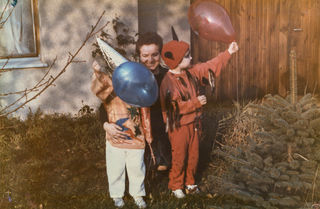Family Dynamics
Why Do Siblings Have Different Memories of Growing Up?
Every sibling perceives experiences from their own vantage point.
Posted August 16, 2016 Reviewed by Ekua Hagan

Siblings usually experience the same thing as they grow up. But we do not always agree about how or when things happened.
My "knothole theory" suggests that each of us looked through a different knothole. Picture a ballpark with an eight-foot-high wooden fence fanned out just beyond the outfield. The fence is old and knots in the wood have dried up and popped out leaving nice knotholes. In the 1920s, kids who couldn't afford a ticket would watch games through such knotholes. They each saw the baseball diamond from a slightly different perspective, and their view of the game depended upon where they were on the other side of the fence. They all could hear the announcer but they might disagree about what they saw.
Perceptions
Perception is the way we think about or understand someone or something, but not all of us perceive things in exactly the same way.
We each grew up in a different family because we were born years apart. My siblings and I agree about many things that happened as we grew up. However, there are some things about which we disagree as we each have our own perception of life as we grew up. For example, when we talk about Uncle Henry or Aunt Frieda, we may say, "I don't remember that about Uncle Henry." It isn't so much that we didn't watch or listen to Henry as much as we each had our own view of him. Our perception may have been influenced by how Uncle Henry treated us as individuals. Or our perception may have been influenced by how he looked. He may have had a very kind expression or a cruel and disagreeable one—it all depended upon the knothole through which we saw him, and it all influenced our perception of him.
I believe that siblings are more likely to be in agreement when there is a recurring memory, such as going to church every Sunday. In other words, we agree or disagree about something depending on how each of us perceives the event.
How We Make Sense of Experiences
While we were growing up, we had the same experiences, but we frequently came to different conclusions about them. We come to such conclusions in an effort to make sense of them but we did not always make sense of them in the same way. For example, when we experienced violent weather on the farm, such as a hailstorm or tornado, measures were taken to protect ourselves, such as going down into the cellar. Our memory and conclusions about the storm depended upon our previous experience with that kind of weather, and how frightened we were. When we reminisce about that storm, each of our stories is somewhat different. I may discount the storm's severity while my sister maximizes it. We may cling to a memory of the storm and have a difference of opinion regarding the event.
Family members have multiple experiences over a lifetime. Everyone in the family tries to find a place in his or her mind to store the experience in a meaningful way. Not everyone will have found the same way to store the experience, though, and therefore when the family reminisces there will be differences.

Conclusion
When one sibling or a parent says, "That's not the way I remember it," it is not necessarily intended as an oppositional statement as much as an honest recall of how the individual came to a conclusion about the experience and stored it away in his or her mind.


